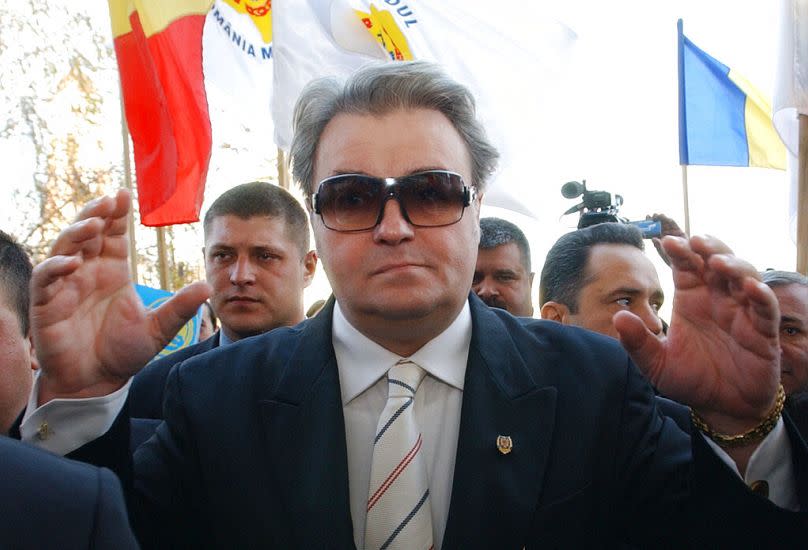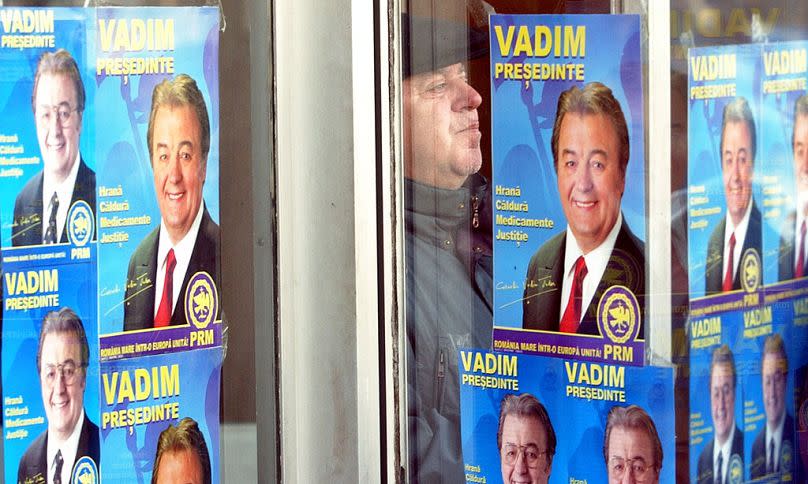Is AUR resorting to tried and tested tricks as Romanian far right's popularity spikes?

In Romania, the most successful political project in this political cycle is definitely the far-right AUR party.
Created by a former leader of football tifos, George Simion, with the help of an intellectual who had tried to rehabilitate interwar fascist leaders, Claudiu Târziu, the party won 9% in the 2020 elections on an anti-system and anti-restriction platform and is now polling at around 20%.
A splinter of the party, the SOS, led by anti-vaccine lawyer Diana Șoșoacă is trying to reach and stay above the 5% electoral threshold. Together, they represent one-quarter of Romanians polled — implying a major swing to the far-right that can't and shouldn't be disregarded.
Lately, Simion has taken steps away from his antisemitic and anti-vaxer talking points in what appears to be an attempt to lure in more moderate voters, raising eyebrows along the way.
In that sense, Israeli PM Benjamin Netanyahu's recent meeting with Simion in Bucharest was a watershed moment for AUR. Simion has indeed formally condemned Holocaust denialism, but it is not clear if there's more to it than just words, as the AUR leadership continue to feature fascist sympathisers.
Also recently, Simion declared, albeit not without mincing his words, that he is not an anti-vaxxer; he said he vaccinated his own kids as he is not “crazy”.
His statement is peculiar as most experts would agree that the party flourished due to its anti-restriction and science-denying stance.
Yet, in a clear example of parallel discourse, Simion started his press declaration with his general support for vaccines, knowing this would make the headlines.
But only once you read the whole statement as reported in the media, it becomes obvious that he is still catering to the anti-restrictions crowd: Simion vocally opposes mandatory vaccination, and seemingly only supports the common vaccination scheme for infants and children and not the COVID-19 jabs.
By the way, this is a made-up issue: nobody is proposing mandatory vaccinations in Romania.
I've seen this trick before
This troubled me for a while. Then, suddenly, I remembered where I had seen this tactic before: it's a page out of the playbook of Corneliu Vadim Tudor, the leader of the far-right Greater Romania Party in the 1990s.
Not only had I seen it, but I also wrote my thesis and my first ever serious academic paper about it. I have known the story my entire professional life.
In a watershed moment for Romanian democracy, Vadim Tudor made it to the second round of presidential elections in 2000 where got a whopping 33% of the vote.

Then, just like now, the Greater Romania Party and Vadim Tudor, colloquially known as Tribunul — a reference to tribunus plebei from ancient Rome — were seen as heavily ideologised actors, true believers whose success was explained exclusively by the extremist inclinations of segments of the population and not by political skill.
Pandemic-born far-right party has rattled crisis-stricken Romania's democratic future
The EU can’t hope for unity until it solves its Schengen conundrum
Simion is often seen the same way: a true believer who does not make a calculated move but is successful because of the deeply held beliefs of his supporters.
But this approach would be self-defeating: if democratic actors and mainstream parties do not accept there is logic and strategy in the actions of the far right, they will not be able to counteract them effectively.
Constructing your enemy as an unstoppable force of nature can save face but will not save the day.
How did Corneliu Vadim-Tudor get the vote?
Initially, the Greater Romania Party, or PRM, was just one of the two major explicitly nationalist parties in Romania. At the time, the entire political spectrum, right or left, was toying with nationalism. Thus, PRM faced strong competition.
Over time, the Party of the National Unity of Romanians (PUNR), the main competitor of the PRM and promoter of a rather performative nationalism devoid of practical consequences, bled votes and disappeared.

Its voters, largely from the Transylvania region, were mostly divided between the far and the democratic right. Over time, even the former president of the PUNR became a PRM member. Thus, PRM remained dominant in the far-right nationalist segment, where it no longer had competitors.
Then, PRM made a sudden volte-face towards the moderate electorate, giving up opposing integration into the EU and even apologising, through the voice of Vadim Tudor, for denying the Holocaust.
Of course, the volte-face was only partial. If one had to read the party publication, the "Greater Romania" magazine, one could notice how the moderate talking points on the first page coexisted with extremist messages inside.
Incompetence and recession helped, too
Of course, bringing a more centrist electorate to a radical party is not easy. But Vadim Tudor had also, by design or chance, timed his actions well: his moderate stances came so late in the electoral cycle that another nationalist party could not be created in time to attack him from the right.
In the mainstream arena, of four significant parties, three espoused some level of nationalism: the National Liberals, the equally national Peasants’ Party (Christian-Democrat) and the Social Democrats.
The first two were in government together; they ruled so poorly and communicated so badly that they lost most of their electoral support by the time the PRM made their move.

The Social Democrats did have a strong nationalistic wing, but the party was heading towards gaining the majority in the Romanian Parliament and was not going to risk the elections by placing themselves on the far end of the PRM.
Thus, the PRM remained dominant in the nationalist far-right segment of the electorate, while its duplicitous centrist stance helped it gain some of the votes lost by those in the government at the time.
Between 1996 and 1999, Romania’s economy shrunk by around 6.5% due to painful (though largely necessary) market-oriented reforms that were implemented in a disorganised fashion.
The economic growth restarted in 2000 under a technocratic government, but it was too late for the governing coalition. In the end, the recession paved the way for the PRM's good results in the elections of 2000.
On the shoulders of giants
Simion and the AUR check most of the boxes for pulling off a successful strategy following in the footsteps of their infamous predecessors.
First, there's dominance and unity. Following the 2020 parliamentary election, Simion and his party became the main voices of the far-right. But Simion's control was not uncontested.
He had had to attract Târziu to keep the fascist nostalgics but, even so, other challengers remained. Șoșoacă, the anti-vax lawyer turned AUR MP, split from the party and became, for a while, a voice as strong as her former colleague Simion.
MEP Cristian Terheș (former Social-Democrat and prior to that, Christian-Democrat) was in a unique position to court the anti-EU vote. Other potential rivals lurked on social and in traditional media.

But Simion got lucky. At the end of 2021, Șoșoacă, his main challenger outside the party had become a social media phenomenon, gathering 22 million Facebook video views in December 2021 — more than the number of Romanian citizens living in the country.
Then, suddenly, in 2022, she became very ineffective on her main channel, going as low as 600,000 video views in April.
Meet the graffiti artist-turned-MP who wants to see Moldova and Romania become one country
How a far-right party came from nowhere to stun Romania in Sunday's election
A decision by Facebook moderators to block the spreading of her content was suspected but never confirmed. A Global Focus Center study shows that she tried to diversify her social media channels but to little avail.
Only recently she made a limited comeback as a guest on the Facebook video productions of a known far-right journalist, yet, she remains vulnerable as she now only has one place to go to make herself widely heard.
From Zelea-Codreanu to 'The Godfather'
Meanwhile, Simion made efforts to bring all the Romanian far right under the same umbrella — his.
Târziu was downgraded from the status of co-president to that of president of an elusive National Coordination Committee, thus losing his formerly equal status with Simion.
Simion even used his wedding for political purposes by inviting “everyone” in the hope of making it a grand political event modelled after the interwar wedding of fascist leader Zelea-Codreanu.
In the end, hundreds of members arrived with party buses and took part in the public part of the wedding. Simultaneously, in the style of "The Godfather", a more private event was meant to entertain all the far-right radicals who mattered; unfortunately for the groom, several key figures politely declined.

Finally, success seemed to have come when the AUR announced its list for the European Parliament. While this list is not final, it includes former competitors like Terheș and lawyer Gheorghe Piperea.
Given their current standing in the polls, AUR is likely to win at least seven seats in the European Parliament. These are cushy positions, with good pay and opportunities to show your supporters that you are fighting against the failing, overbearing EU.
Such enticing benefits seem to have been enough to bring together the former competitors.
And so, at present, there is essentially one party that is the natural choice of the far right, and this party has a single leader: Simion.
The Tribunul speaks from his grave
Only once this domination was established, did the centrist overtures become public.
He already has strong talking points for the far-right voters (who now have little alternative anyway), and now he is building a centrist discourse for people angry at social issues but squeamish towards outright far-right nationalism.
The latter are getting radicalised by high inflation, fears of a possible Russian invasion, government incompetence and corruption; they care less about a national rebirth of any kind and may even actively dislike some of Simion’s antics.
But, then there's also timing. It is a bit late to create another party to take advantage of Simion and AUR’s newly discovered fondness for the Jewish community and vaccines.
True, the AUR is more vulnerable than the PRM was: on its far side there is the SOS party and its leader Șoșoacă. However, Șoșoacă is openly pro-Russian in a country where 60-70% of Romanians declare they are at least somewhat fearful of a Russian invasion.

Thus, history seems to be repeating itself. Of course, the connoisseurs of Romanian affairs will be able to point out many differences between the PRM and the AUR.
But the common pattern is clear: both parties survived their main competitors and brought some of these competitors on board. Both co-opted some of the more pliable alternative leaders, and both signalled towards the centre while not really abandoning extremist discourse.
And most dangerously, the climate in Romania is similar to that of a quarter of a century ago. Just like in 2000, the times are again tough and the coalition government is anything but.
But if you need further proof that all this is not just an accident, I have another fact (well, maybe a factoid) for you.
Just recently, Simion brought the daughter of Vadim Tudor, Lidia, to AUR. She claimed she was guided to accept this position by her father, from beyond the grave, who led her to do so with an “invisible thread”. So, there’s that.
The past says this still won't be enough
What comes next? In 2000, the predecessors of the current Social Democrats won a majority in both chambers of the Parliament.
In the second round of the presidential election, Ion Iliescu, a former Communist apparatchik, won by a landslide: even though a third of the electorate wanted to embark on an extremist adventure, two-thirds did not.
Over time, as a result of increased prospects of European Integration, the PRM became irrelevant and finally disappeared and Iliescu became a true moderate despite his previous (occasionally violent) abuses of power.
But the scare convinced the political, intellectual and civic elites that the population was deeply illiberal and would never fully embrace progress and democracy unless bribed or tricked.
This opinion only started to fade in 2018, when a referendum to enshrine heterosexual marriage in the country's Constitution failed embarrassingly for the proponents.
The results of AUR at the polls should not be feared that much — Romania is a country of ever-decreasing ethnic tension and largely devoid of political violence, so one can believe there is a natural limit to what they can achieve in elections.
But the fear that remains real is that the mainstream parties may misread the situation and embrace far-right elements and personalities in a misguided attempt to fight fire with fire. And if so, only Simion stands to profit.
Andrei Tiut is Programme Director for Democratic Resilience at the Bucharest-based GlobalFocus Centre. He specialises in the Romanian far right and Russian-aligned propaganda.
At Euronews, we believe all views matter. Contact us at view@euronews.com to send pitches or submissions and be part of the conversation.


